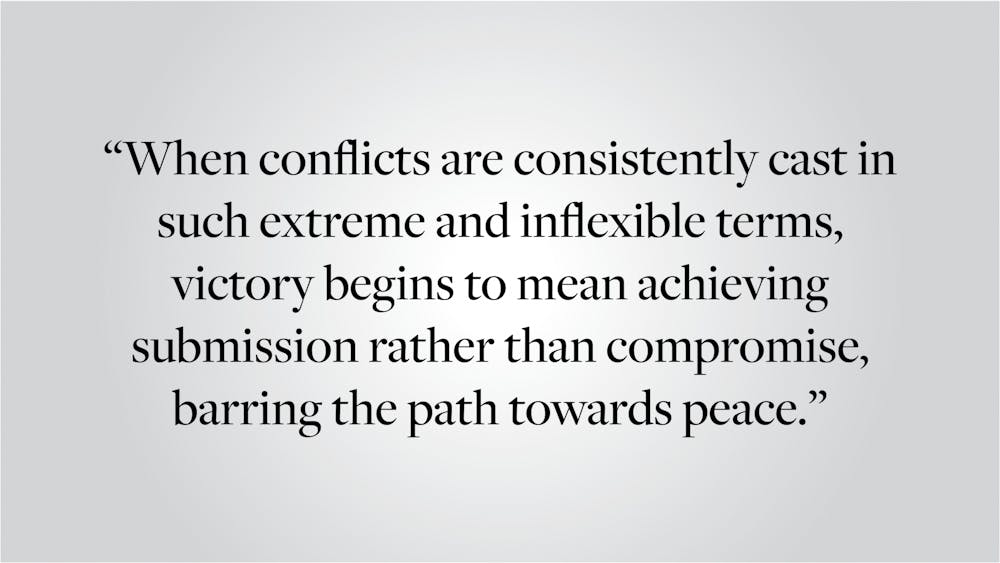In 2017, I co-founded Brown War Watch, a student-led activist group driven by the vision of a more peaceful world. One mechanism for advancing this goal has been to strive for a change in U.S. public discourse, and consequently a less aggressive foreign policy. This strategy is driven by the outsized influence that U.S. opinions and policy have on life across the globe. For instance, I am keenly aware how much an election in the United States affects my loved ones in Iran — far more than their votes in Iran ever would. The war in Ukraine is likewise shaped in no small part by discourse in the United States and the government’s consequent involvement in diplomatic and military efforts.
My heart breaks for Ukrainian lives that burn in the flames of imperialism, fueled by nationalist rhetoric. What is to be done when a powerful country like Russia ravages a much weaker nation while denying the legitimacy of its very existence? It takes more space than the current piece can afford to even begin to articulate a principled, peace-oriented policy position in response to such a sadly common turn of events, but Brown War Watch’s latest collective attempt at formulating such a position is available on our website. Approaching acts of aggression with a peace-oriented rather than a war-oriented mindset can help make the policy recommendations set forth in our statement a reality.
The atrocities in Ukraine do not set the war apart from other recent conflicts. The war in Yemen, in which the U.S. has been involved in support of a brutal dictatorship for many years, has shown that no Yemeni wedding, hospital or school bus is safe from airstrikes. What sets Ukraine apart is the intense grandstanding of Western framings of the war: a clash of civilizations, a battle for the future of the West or the fight between freedom and tyranny itself. While sacred values that we are reluctant to compromise are invoked to justify nearly all military engagements, the intensity of the current rhetoric is arguably only matched by that surrounding the post-9/11 War on Terror. When conflicts are consistently cast in such extreme and inflexible terms, victory begins to mean achieving submission rather than compromise, barring the path towards peace. In such atmospheres, dehumanization takes hold, reflected for instance in professional repercussions for Russians who have even condemned the war and its atrocities. It is this totalist mindset that prompted Ukraine’s finance minister, for instance, to wish suffering on every ordinary Russian — as if within a political system that is shedding any last veneers of democracy they had any say in the war.
I was born less than two years after the culmination of Iran and Iraq’s disastrous eight-year war. I have seen firsthand the results of sacred, civilization-defining framing of conflicts. Iraqi depictions of the war considered Iranians Zoroastrians disguised as Muslims, suggesting its invasion of Iran was a war of necessity waged by the Islamic world against an incompatible, aggressive culture. Partly through the success of his ideological framing of the conflict, Iraqi President Saddam Hussein garnered massive military support from both the Soviet Union and the United States. Iran in turn named the war The Holy Defense, suggesting that Iranian national and religious identity was at stake. Such frames extended the war for six more painful years once Iraqi forces retreated from Iranian lands, past the point at which any pragmatic considerations could justify its continuation and until both sides were broken and unable to continue with hostilities. Judging from recent Russian and Ukrainian statements, I fear the gruesome Ukraine war will proceed in a similar manner, lasting far longer than even the involved parties expect. The Iran-Iraq war facilitated Iran’s metamorphosis from a budding democracy into an authoritarian regime, a shift that proved irreversible and the effects of which haunt Iranians to this day. I am afraid I see the same happening not only in Russia, but also in Ukraine, where the government recently banned 11 opposition parties and is aiming to consolidate mass media.
Even if total victory were possible in a war waged between a major world power and a country heavily supported by a superpower and its allies, can we truly believe that the resulting peace would be lasting? The humiliation such endings inflict on the loser threaten to bring about further, more vicious rounds of violence, sometimes generations later, unless proper reconciliation occurs. Consider how the terms decided at the end of World War I set the stage for World War II, or how the continued U.S. occupation of Afghanistan after the Taliban had offered to surrender in 2001 led to the latter’s victory twenty years later.
I therefore invite us to ask ourselves if moral grandstanding is in the interests of Ukrainians, whose ravaged lands have become testing grounds for all manners of weapons, training grounds for unsavory extremist groups and the source of millions of refugees. Should the goal not be peace as soon as possible, rather than pummeling one side into submission? If lasting peace is the goal, I have difficulty seeing it in mainstream media.
Instead of being whipped into a frenzy by the civilizational narratives and overly moralized war cries of commentators, politicians and war profiteers who support them, we should keep the supreme goal of this moment in mind: ending the war as soon as possible to minimize the incredible suffering that it engenders. That means earnestly negotiating with those whose actions we abhor, making difficult geopolitical compromises, not dehumanizing people based on nationality and not preventing those who live amongst us from engaging in professional activities. No amount of weapons poured into Ukraine can sustainably stem the tides of hatred and blood, but with a peace-oriented mindset, the horrors inflicted by Russia’s invasion may end more swiftly.
Babak Hemmatian can be reached at babak_hemmatian@brown.edu. Please send responses to this opinion to letters@browndailyherald.com and op-eds to opinions@browndailyherald.com.





